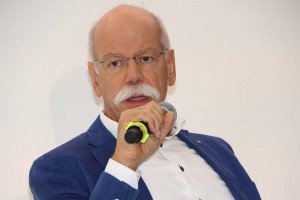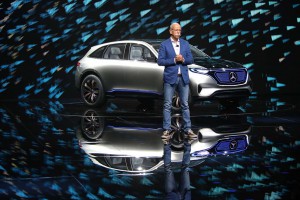The new Mercedes-Benz E-Class has scored a home run with luxury buyers – and with investors, demand for the new midsize model helping parent Daimler AG deliver a 13% increase in earnings for the third quarter.
Sales of the 2017 E-Class, as well as Mercedes’ expanding line-up of SUVs, helped offset a slump in Daimler’s truck business, the German maker handily exceeding analysts’ expectations for the July-September quarter.
Earnings for the period hit 2.73 billion euros, or $2.97 billion, up from 2.42 billion euros during the third quarter of 2015. Revenues rose 4%, to 38.6 billion euros, or $42.4 billion. On a unit basis, sales of passenger cars rose 11%, to 565,564.
The results for the quarter showed “one more time that we are pursuing the right strategy,” said Daimler AG CEO Dieter Zetsche, who also runs the Mercedes-Benz brand.
(Daimler building engine plant in Poland. Click Here for the story.)
While Daimler delivered a surprise with its numbers, the company’s share price actually slipped a bit in early European trading, in part due to concerns about whether the company can maintain its momentum going forward.

Zetsche said Daimler's financial performance last quarter shows it is headed in the right direction strategically.
“The car business is going well for Daimler, but the area where they have some challenges is the truck division, which is a problem for the whole industry because markets in the U.S. and developing countries like Brazil are slowing,” cautioned Christian Stadler, professor of Strategic Management at Britain’s Warwick Business School.
In May, Daimler Trucks issued a profit alert and warned that job cuts could follow.
The truck market isn’t the only concern. Bodo Uebber, Daimler’s finance director, pointed to slight weakening of sales in Britain last month, warning that the impact of Brexit – the U.K. vote to leave the European Union – was “gradually becoming noticeable.”
(Click Here for more about why Smart is “all in” on battery cars.)
Uebber also said Daimler faces challenges with uncertain currency markets around the world. On the plus side, the company is likely to actually post a gain from foreign exchange for all of 2016.
One of the longer-term challenges Daimler faces is the ongoing transformation of the luxury car market, as well as the automotive industry in general. The company tried to address those issues during its news conference at last month’s Paris Motor Show.
Zetsche laid out what he called the “CASE” for the future, touching on Daimler’s efforts in connected car systems, autonomous driving, car- and ride-sharing and electrification. That included the debut of the Generation EQ concept vehicle, billed as the first in a wave of planned battery-electric vehicles that will be sold through the new Mercedes-EQ sub-brand.
But other, traditional luxury makers, notably including BMW, have outlined similar strategies. And a number of new competitors are entering or expanding their presence in the market. Electric carmaker Tesla this week announced all future models will be equipped with autonomous driving capabilities. Chinese-backed start-ups LeEco and Faraday Future outlined plans for autonomous electric vehicles, and even Henrik Fisker was back in the news showing off a prototype of his own new EV.
(For more on Daimler’s plans, Click Here.)
Nonetheless, the immediate future looks good, according to Daimler CFO Uebber, who told reporters that, “Daimler remains on track to achieve our earnings forecasts for the full year, despite volatile sales and finance markets.”

